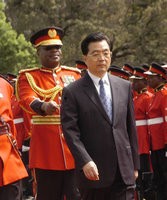International relations experts are pretty much down on everything nowadays. America, we are told, is incapable of global leadership: too discredited overseas, too few resources back home, too little will -- period. For a brief moment there, while China held up the global economy during the recent financial crisis, much credence was given to the notion that we were on the verge of a Chinese century. But that popular vision has also waned surprisingly quickly, and now the conventional wisdom centers on China’s great weaknesses, challenges and overall brittleness. Amazingly, where we spoke of a U.S.-China “G-2” arrangement just a few short years ago, now there is a sense that no one is in charge.
Political scientist Ian Bremmer dubs that reality a “G-Zero world,” arguing in his soon-to-be-published book, “Every Nation for Itself,” that such an era begets a “free for all” competition that is worrisome, but hardly Hobbesian. After casually dismissing a worst-case “G-Subzero” world in which states are superseded by a generalized anarchy, Bremmer frets -- briefly -- about a second Cold War between China and America. But he spends most of his time regretting the global order’s turn toward regionalism following the global financial crisis.
Such a turn is, in itself, hardly surprising. Globalization’s rapid expansion after the Cold War’s end chugged on for almost two decades, knitting the world together in ways unthinkable to anyone who lived through the previous era. What was scariest about that time is now being addressed in this low period: the lack of sufficiently robust regional institutions in most of the world. So long as everyone was getting richer, such institutional gaps seemed insignificant. But now that we’re in a long trough of painful structural changes, they loom large, and that’s where Bremmer’s book is most convincing.

